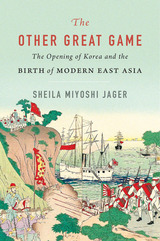
Between 1876 and 1945, thousands of Japanese civilians—merchants, traders, prostitutes, journalists, teachers, and adventurers—left their homeland for a new life on the Korean peninsula. Although most migrants were guided primarily by personal profit and only secondarily by national interest, their mundane lives and the state’s ambitions were inextricably entwined in the rise of imperial Japan. Despite having formed one of the largest colonial communities in the twentieth century, these settlers and their empire-building activities have all but vanished from the public memory of Japan’s presence in Korea.
Drawing on previously unused materials in multi-language archives, Jun Uchida looks behind the official organs of state and military control to focus on the obscured history of these settlers, especially the first generation of “pioneers” between the 1910s and 1930s who actively mediated the colonial management of Korea as its grassroots movers and shakers. By uncovering the downplayed but dynamic role played by settler leaders who operated among multiple parties—between the settler community and the Government-General, between Japanese colonizer and Korean colonized, between colony and metropole—this study examines how these “brokers of empire” advanced their commercial and political interests while contributing to the expansionist project of imperial Japan.

The Korean materials in the Griffis Collection at Rutgers University consist of journals, correspondence, articles, maps, prints, photos, postcards, manuscripts, scrapbooks, and ephemera. These papers reflect Griffis's interests and activities in relation to Korea as a historian, scholar, and theologian. They provide a rare window into the turbulent period of late nineteenth- and twentieth-century Korea, witnessed and evaluated by Griffis and early American missionaries in East Asia. The Korea Letters in the William Elliot Griffis Collection are divided into two parts: letters from missionaries and letters from Japanese and Korean political figures. Newly available and accessible through this collection, these letters develop a multifaceted history of early American missionaries in Korea, the Korean independence movement, and Griffis's views on Korean culture.

A dramatic new telling of the dawn of modern East Asia, placing Korea at the center of a transformed world order wrought by imperial greed and devastating wars.
In the nineteenth century, Russia participated in two “great games”: one, well known, pitted the tsar’s empire against Britain in Central Asia. The other, hitherto unrecognized but no less significant, saw Russia, China, and Japan vying for domination of the Korean Peninsula. In this eye-opening account, brought to life in lucid narrative prose, Sheila Miyoshi Jager argues that the contest over Korea, driven both by Korean domestic disputes and by great-power rivalry, set the course for the future of East Asia and the larger global order.
When Russia’s eastward expansion brought it to the Korean border, an impoverished but strategically located nation was wrested from centuries of isolation. Korea became a prize of two major imperial conflicts: the Sino-Japanese War at the close of the nineteenth century and the Russo-Japanese War at the beginning of the twentieth. Japan’s victories in the battle for Korea not only earned the Meiji regime its yearned-for colony but also dislodged Imperial China from centuries of regional supremacy. And the fate of the declining tsarist empire was sealed by its surprising military defeat, even as the United States and Britain sized up the new Japanese challenger.
A vivid story of two geopolitical earthquakes sharing Korea as their epicenter, The Other Great Game rewrites the script of twentieth-century rivalry in the Pacific and enriches our understanding of contemporary global affairs, from the origins of Korea’s bifurcated identity—a legacy of internal politics amid the imperial squabble—to China’s irredentist territorial ambitions and Russia’s nostalgic dreams of recovering great-power status.


Relations between the Chosŏn and Qing states are often cited as the prime example of the operation of the “traditional” Chinese ”tribute system.” In contrast, this work contends that the motivations, tactics, and successes (and failures) of the late Qing Empire in Chosŏn Korea mirrored those of other nineteenth-century imperialists. Between 1850 and 1910, the Qing attempted to defend its informal empire in Korea by intervening directly, not only to preserve its geopolitical position but also to promote its commercial interests. And it utilized the technology of empire—treaties, international law, the telegraph, steamships, and gunboats.
Although the transformation of Qing–Chosŏn diplomacy was based on modern imperialism, this work argues that it is more accurate to describe the dramatic shift in relations in terms of flexible adaptation by one of the world’s major empires in response to new challenges. Moreover, the new modes of Qing imperialism were a hybrid of East Asian and Western mechanisms and institutions. Through these means, the Qing Empire played a fundamental role in Korea’s integration into regional and global political and economic systems.

READERS
Browse our collection.
PUBLISHERS
See BiblioVault's publisher services.
STUDENT SERVICES
Files for college accessibility offices.
UChicago Accessibility Resources
home | accessibility | search | about | contact us
BiblioVault ® 2001 - 2024
The University of Chicago Press









